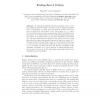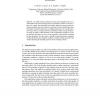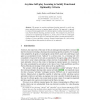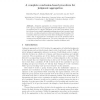119
click to vote
ALDT
2009
Springer
15 years 7 months ago
2009
Springer
Abstract. An optimal probabilistic-planning algorithm solves a problem, usually modeled by a Markov decision process, by finding its optimal policy. In this paper, we study the k ...
109
Voted
ALDT
2009
Springer
15 years 7 months ago
2009
Springer
Abstract. The stable marriage problem has many practical applications in twosided markets like those that assign doctors to hospitals, students to schools, or buyers to vendors. Mo...
ALDT
2009
Springer
15 years 7 months ago
2009
Springer
Abstract. Several schemes have been proposed for compactly representing multiattribute utility functions, yet none seems to achieve the level of success achieved by Bayesian and Ma...
101
Voted
ALDT
2009
Springer
15 years 7 months ago
2009
Springer
Abstract. We propose various models for lobbying in a probabilistic environment, in which an actor (called “The Lobby”) seeks to influence the voters’ preferences of voting ...
124
Voted
ALDT
2009
Springer
15 years 7 months ago
2009
Springer
We present an anytime multiagent learning approach to satisfy any given optimality criterion in repeated game self-play. Our approach is opposed to classical learning approaches fo...
ALDT
2009
Springer
15 years 7 months ago
2009
Springer
In sports competitions, teams can manipulate the result by, for instance, throwing games. We show that we can decide how to manipulate round robin and cup competitions, two of the ...
92
Voted
ALDT
2009
Springer
15 years 7 months ago
2009
Springer
Most work in game theory is conducted under the assumption that the players are expected utility maximizers. Expected utility is a very tractable decision model, but is prone to w...
101
click to vote
ALDT
2009
Springer
15 years 7 months ago
2009
Springer
Judgment aggregation is a formal theory reasoning about how a group of agents can aggregate individual judgments on connected propositions into a collective judgment on the same pr...




